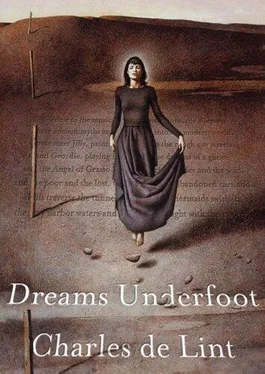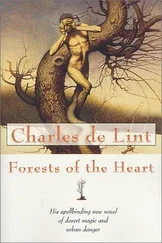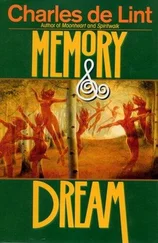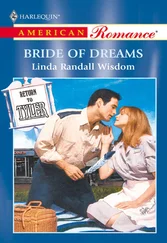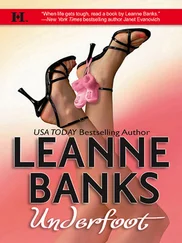“The question is more important than the answer,” it said.
I frowned, puzzling over it, then looked at what I would have gotten if I’d picked another number, but all the other folds were blank when I turned them over. I stared at it, then folded the whole thing back up and stuck it in my pocket. I was starting to get a serious case of the creeps.
Picking up my fiddlecase, I left St. Paul’s and wandered over to Chinatown. I had breakfast in an allnight diner, sharing the place with a bunch of bluecollar workers who were all talking about some baseball game they’d watched the night before. I thought of calling Jilly, but knew that if she’d been working all night on that In the City assignment, she’d be crashed out now and wouldn’t appreciate a phone call.
I dawdled over breakfast, then slowly made my way up to that part of Foxville that’s called the Rosses. That’s where the Irish immigrants all lived in the forties and fifties. The place started changing in the sixties when a lot of hippies who couldn’t afford the rents in Crowsea moved in, and it changed again with a new wave of immigrants from Vietnam and the Caribbean in the following decades. But the area, for all its changes, was still called the Rosses. My apartment was in the heart of it, right where Kelly Street meets Lee and crosses the Kickaha River. It’s two doors down from The Harp, the only real Irish pub in town, which makes it convenient for me to get to the Irish music sessions on Sunday afternoons.
My phone was ringing when I got home. I was halfexpecting it to be Jilly, even though it was only going on eight, but found myself talking to a reporter from The Daily Journal instead. His name was Ian Begley, and it turned out he was a friend of Jilly’s. She’d asked him to run down what information he could on the Dickensons in the paper’s morgue.
“Old man Dickenson was the last real businessman of the family,” Begley told me. “Their fortunes started to decline when his son Tom took over—he’s the one who married the woman that Jilly said you were interested in tracking down. He died in 1976. I don’t have an obit on his widow, but that doesn’t necessarily mean she’s still alive. If she moved out of town, the paper wouldn’t have an obit for her unless the family put one in.”
He told me a lot of other stuff, but I was only half listening. The business with Paperjack last night and the fortunetelling device this morning were still eating away at me. I did take down the address of Sam’s granddaughter when it came up. Begley ran out of steam after another five minutes or so.
“You got enough there?” he asked.
I nodded, then realized he couldn’t see me. “Yeah. Thanks a lot.”
“Say hello to Jilly for me and tell her she owes me one.”
After I hung up, I looked out the window for a long time. I managed to shift gears from Paperjack to thinking about what Begley had told me, about wheels, about Sam. Finally I got up and took a shower and shaved. I put on my cleanest jeans and shirt and shrugged on a sports jacket that had seen better days before I bought it in a retro fashion shop. I thought about leaving my fiddle behind, but knew I’d feel naked without it—I couldn’t remember the last time I’d gone somewhere without it. The leather handle felt comforting in my hand as I hefted the case and went out the door.
All the way over to the address Begley had given me I tried to think of what I was going to say when I met Sam’s granddaughter. The truth would make me sound like I was crazy, but I couldn’t seem to concoct a story that would make sense.
I remember wondering—where was my brother when I needed him? Christy was never at a loss for words, no matter what the situation.
It wasn’t until I was standing on the sidewalk in front of the house that I decided to stick as close to the truth as I could—I was an old friend of her grandmother’s, could she put me in touch with her?—and take it from there. But even my vague plans went out the door when I rang the bell and stood faceto-face with Sam’s granddaughter.
Maybe you saw this coming, but it was the last thing I’d expected. The woman had Sam’s hair, Sam’s eyes, Sam’s face ... to all intents and purposes it was Sam standing there, looking at me with that vaguely uncertain expression that most of us wear when we open the door to a stranger standing on our steps.
My chest grew so tight I could barely breathe, and suddenly I could hear the sound of rain in my memory—it was always raining when Sam saw the ghost; it was raining the night he stole her away into the past.
Ghosts. I was looking at a ghost.
The woman’s expression was starting to change, the uncertainty turning into nervousness. There was no recognition in her eyes. As she began to step back—in a moment she’d close the door in my face, probably call the cops—I found my voice. I knew what I was going to say—I was going to ask about her grandmother—but all that came out was her name: “Sam.”
“Yes?” she said. She looked at me a little more carefully. “Do I know you?”
Jesus, even the name was the same.
A hundred thoughts were going through my head, but they all spiraled down into one mad hope: this was Sam. We could be together again. Then a child appeared behind the woman. She was a little girl no more than five, blondehaired, blueeyed, just like her mother—just like her mother’s grandmother.
Reality came crashing down around me.
This Sam wasn’t the woman I knew. She was married, she had children, she had a life.
“I ... I knew your grandmother,” I said. “We were ... we used to be friends.”
It sounded so inane to my ears, almost crazy. What would her grandmother—a woman maybe three times my age if she was still alive—have to do with a guy like me?
The woman’s gaze traveled down to my fiddlecase. “Is your name Geordie? Geordie Riddell?”
I blinked in surprise, then nodded slowly.
The woman smiled a little sadly, mostly with her eyes.
“Granny said you’d come by,” she said. “She didn’t know when, but she said you’d come by one day.” She stepped away from the door, shooing her daughter down the hall. “Would you like to come in?”
“I ... uh, sure.”
She led me into a living room that was furnished in mismatched antiques that, taken all together, shouldn’t have worked, but did.
The little girl perched in a Morris chair and watched me curiously as I sat down and set my fiddlecase down by my feet. Her mother pushed back a stray lock with a mannerism so like Sam’s that my chest tightened up even more.
“Would you like some coffee or tea?” she asked.
I shook my head. “I don’t want to intrude. I I ...” Words escaped me again.
“You’re not intruding,” she said. She sat down on the couch in front of me, that sad look back in her eyes. “My grandmother died a few years ago—she’d moved to New England in the late seventies, and she died there in her sleep. Because she loved it so much, we buried her there in a small graveyard overlooking the sea.”
I could see it in my mind as she spoke. I could hear the sound of the waves breaking on the shore below, the spray falling on the rocks like rain.
“She and I were very close, a lot closer than I ever felt to my mother.” She gave me a rueful look.
“You know how it is.”
She didn’t seem to be expecting a response, but I nodded anyway.
“When her estate was settled, most of her personal effects came to me. I ...” She paused, then stood up. “Excuse me for a moment, would you?”
I nodded again. She’d looked sad, talking about Sam. I hoped that bringing it all up hadn’t made her cry.
The little girl and I sat in silence, looking at each other until her mother returned. She was such a serious kid, her big eyes taking everything in; she sat quietly, not running around or acting up like most kids do when there’s someone new in the house that they can show off to. I didn’t think she was shy; she was just ... well, serious.
Читать дальше
